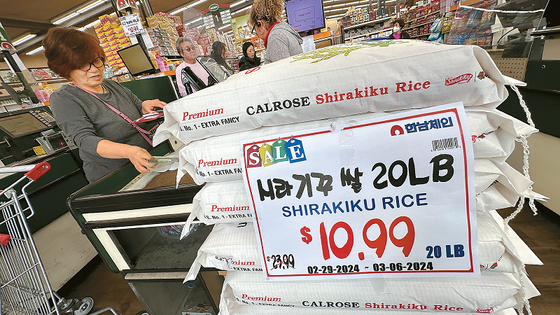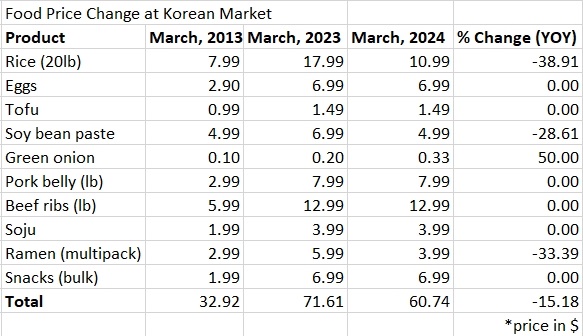With food spending at a 30-year high, food prices in Korean markets continue to trend downward.
The prices listed of staple foods at Korean markets on the first weekend of March were down 15 percent from a year ago, according to Korean market advertisements.
To track the rate of food inflation, the Korea Daily selected 10 food items, including rice, eggs, tofu, green onions, pork belly, beef ribs, soju, ramen, and snacks, which are favored by Koreans and compared their prices in 2013, 2023, and 2024.

The 10 items cost $32.92 in 2013 but cost $71.61 in 2023. That’s a 118% increase in food costs in 10 years. On March 1, 2024, the total cost of the 10 items was $60.74, actually down 15% from $71.61 year-over-year.

While food prices are increasing across the board, shoppers are experiencing a decrease in their bills at Korean markets, thanks to aggressive discount sales.
“We changed our pricing policy by continuously analyzing the grocery shopping patterns of consumers and lowering the prices of our best-selling products,” said Jongpil Hwang, manager of Galleria Market at Olympic Blvd, “We doubled the number of discounted items and diversified the food products we offer.” “We have also increased the number of discounted items and diversified the products we offer. And we have also adjusted the prices of daily staples on the Korean-American dinner table to pre-inflation levels and increased discounts on new products.”
One of the most aggressive price reductions is rice. After soaring to $21.99 in the fall of 2022, the price of CJ Chun Ha Il Mi (20 lbs) has dropped by 50% to $10.99. Compared to the pre-pandemic discounted price of $8.99, it is still 22% more expensive. CJ Barn Barn Mi (20 lbs) has also dropped nearly 50% to $12.99 from $25 two years ago. The $15.99 box of ready-to-eat rice has also dropped and is now priced between $9.99 and $10.99.
Sale prices for instant noodles, including multipacks, cup noodles, and bowl noodles, have also returned to pre-pandemic levels. A bag of multipack instant noodles such as Shin Ramyun, Chapaghetti, Ansung Noodle Soup, Samyang Ramen, and Jin Ramen can be purchased for $3.99, a box of Jin Ramen (12 pieces) for $11.99, and 6 packs of Jin Ramyun for $4.99.
What stands out is the price drop on boxed fruit. Last holiday season, a box of Bluejay mandarins was as high as $34, but it’s down to $22.99 – $24.99, while gift boxes of Fuji Apple have also dropped from $19.99 to $12.99 – $13.99, and boxes of pears from $26.99 to $28.99 – $24.99.
Tofu, which used to cost more than $2 a package, dropped below $1.50. Korean markets in LA are selling Pulmuone Tofu for as low as $1.49.
Many meal kits have also returned to pre-pandemic prices. A bag of udon noodle meal kits, which have ranged from $5.99 to $6.99 over the past two years, is on sale for $3.99 at most markets this weekend. Cans of sea snails are also on sale for $5.99, down from $7.99 to $8.99.
In particular, shoppers can save up to 30% on marinades and sauces when taking advantage of the weekend brand collections at each market.
At Hannam Chain in LA, CJ and Chun Jung One are running specials this weekend. Fried pancake powder for $2.99, deep-frying powder for $1.99, beef short rib seasoning for $3.99, pork cutlet sauce for $2.99, and ssamjang for $4.99 are on sale at 20-30% off.
BY EUNYOUNG LEE, HOONSIK WOO [lee.eunyoung6@koreadaily.com]




